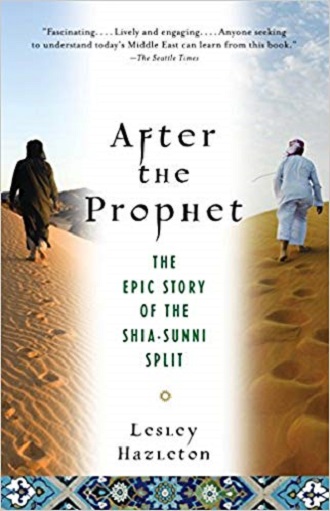To read the full PDF version, click here
To listen to the full audio version, click here (TBD)
To purchase and/or read additional reviews, see Amazon page here
What do I love about: The Epic Story of the Shia-Sunni Split?
The sensational Lesley Hazleton again provides the readers insight into the historic split between the Shia’s and Sunni’s. Having read her initial book; The First Muslim, this book provides a continuation of the story she had earlier introduced. This book provides context into the violence that has ramped the Islam religion due to the debate over Muhammed’s successor. They say religion and politics are two discussion points to avoid and whilst I tried to speak little at my book club to avoid offending the Islam members, the book included provoking thoughts that I couldn’t overlooked. I also love that the book included a map of the main clan and family relationships as depicted throughout the book.
What do I not love about: The Epic Story of the Shia-Sunni Split?
Zilch
Who should read: The Epic Story of the Shia-Sunni Split?
If like me, you are curious about religion especially Islam then this is highly recommended. This book will provide insights into the background of a lot of Islam practices as well as the rift that exist within Islam.
Who should not read: The Epic Story of the Shia-Sunni Split?
Individuals who are not open minded may not have an interest in this read.
Notes from The Epic Story of the Shia-Sunni Split
Part 1: Muhammed
- I am from Ali and Ali is from me; he is the guardian of every believer after me”, he said. Ali was to him “as Aaron was to Moses,” he declared. “None but a believer loves Ali, and none but an aphostate hates him”. And most famously, especially for the mystical Sufis, for whom Ali would become the patron saint of knowledge and insight: “I am the City of Knowledge and Ali is its gateway.”
- The revelation of the curtain clearly applied only to the prophets wives, but this in itself gave the veil high status. Over the next few decades it would be adopted by women of the new Islamic aristocracy- and would eventually be enforced by Islamic fundamentalists convinced that it should apply to all women.
- We know what words were used, but what did they mean? Arabic is a language of intricate subtleties. The word translated as “master” is mawla, which can mean leader, or patron, or friend and confidant.
- Despite all the impassionate claims, all the religious certainties and fiery oratory and ghastly massacres to come, the enduring irony is that “absolute” truth is the one thing that can never be established. It does not exist even in science; how much less so in history.
Part 2: Ali
- Ali had been thoroughly outmaneuvered. No matter that he could plainly see how Muawiya had manipulated the situation, or that one of the most worldly of men had used faith as a weapon against one of the most spiritual.
- When one of his own sons appeared drunk in public, Omar ordered that the young man be given eighty lashes of the whip, and refused to mourn when he died as a result of the punishment.
Part 3: Hussein
- Aisha told the stories again and again, refining them each time, and if anyone pointed out that her recollections sometimes contradicted one another, she would take a tack familiar to modern politicians. She has misspoken then, she would say, but was speaking correctly now. Or in a still more familiar tactic, she would simply deny ever having said whatever it was she had said before.
- Yet this ignominious death in the desert, like that ignominious death on the cross six centuries earlier, would prove to be not the end but only the beginning.
- Religion is an amazing phenomenon that plays contradictory roles in peoples lives, said Ali Shariati, the charismatic lecture who helped lay the intellectual foundation of the Iranian Revolution of 1979. “It can destroy or revitalize, put to sleep or awaken, enslave or emancipate, teach docility or teach revolt”.
- The SUNNIS, in effect, would honor history as it had taken shape; the SHIA would honor it as they believe it should have taken shape, and as they maintain it indeed did in a realm other than the worldly one.
- As with any matter of faith, in modern America as much as in the Middle East of centuries ago, the Sunni-Shia split could always be manipulated for political advantage.
- Unity is POWER and Division is WEAKNESS
- But whether sacredness inheres in the prophet’s blood family, as the SHIA believe, or in the community as a whole, as SUNNIS believe, nobody in the west should forget that what unites the two main branches of Islam is far greater than what divides them, and that the vast majority of all Muslims still cherish the ideal of unity preached by Muhammed himself- an ideal the more deeply held for being so deeply broken
